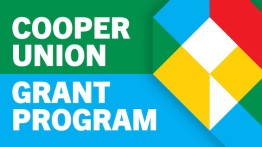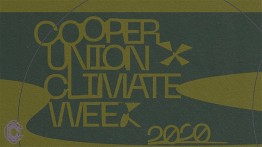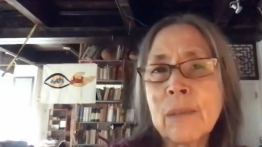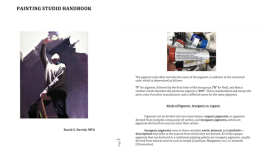Despite COVID, 2019–20 Grants Proved Valuable to Cooper Community
POSTED ON: December 10, 2020
In Spring 2019, the President’s Office announced the inaugural Cooper Union Grant Program, an in-house initiative directed at students, faculty, and staff in need of funding for any project designed to improve the school on a number of fronts, from course offerings to faculty development to public programming. The program began soon after the school's Board of Trustees approved Cooper's institutional goals and strategic priorities. Proposed projects must, in some way, fulfill those goals, and last year's projects did so in a host of creative ways.
The projects funded last year covered a broad range of interests—from innovative art history courses to making Frankie’s Kitchen more environmentally friendly—though most focused on the climate crisis. These included funding for a sustainable agriculture project, a center for sustainability, hydroponic farming research, and events for Cooper Climate Week. The grants ranged from $500 to $10,000 depending upon the needs as laid out in a budget submitted with each grant winner’s application. In total, $133,000 in grants were awarded.
As grant winner Alisa Petrosova sees it, the program allows students to spearhead initiatives of importance to them, instead of following faculty’s lead. “It flips the traditional hierarchies,” she said at an information session about the grants held in October.
Charlotte Wessell, director of the Office of the President and Board Relations, noted that “one of the goals here is to start something bigger, beyond the initial proposal.” She pointed to the funding of Cooper Climate Week in 2019 that launched discussion and projects far beyond that week’s events.
The pandemic, of course, radically altered grantees’ plans, with some able to convert their projects to an online format, but many having to delay work on their proposals. Below are just a few of the projects that have either been executed despite COVID or partly completed.
Professor Stéphanie Jeanjean, an adjunct in the Faculty of Humanities and Social Sciences, used her grant to develop a course entitled Art Beyond Sight. As an adjunct, she said, it would be financially impossible to take the many hours needed to create a new course without institutional funding. (Approximately half of last year’s grants were used to give faculty or students time to develop a project.) Her grant was one of nine that were underwritten by the Benjamin Menschel Faculty Fellowship. The class she developed examines accessibility in museums and the visual arts in general. After she created the course, it was approved by the curriculum committee, and was first offered this semester at HTA 312 for art and architecture students. Not only does the class provide a stellar roster of speakers on accessibility and art, it also gives students the chance to be involved in accessibility programs organized by the Guggenheim Museum, MoMA, the Museum of Art and Design, and the Poster House. “Students are invited to work on tangible projects, which can expand the access of visual arts and museums to audiences with all levels of abilities,” Professor Jeanjean noted. The course will be offered again in future semesters.
David Derish, technician in the School of Art’s Painting Office, produced a highly useful handbook for students to use as a reference. “Being an artist myself,” he said in a recent interview, “I know that a solid understanding of the technical aspects of creating art is fundamental to a successful studio practice, and it was important to me to apply what I have learned in my years of studio work to promote an approach to making art that prioritizes safety and efficiency, as well as protecting the environment.”
The handbook covers expected subjects like how to build stretchers and supports, how to select which materials and tools to use on their painting projects, and other crucial technical information. But as he worked on the handbook, he realized that students would also benefit from sections about handling stress (both mental and physical) and keeping themselves safe when using toxic materials.
“Working closely with the students in the studios made it clear to me that some sort of handy and readily-available comprehensive guide to studio practice for students would simplify and facilitate their technical training and enhance their overall artistic educational experience at The Cooper Union.”
Although he created the handbook to be a printed resource or one that could be downloaded from the school’s web site [link here], he applied for a second grant with the hopes of making a digital version that will have the added advantage of links to useful demonstration videos as well as step-by-step illustrations he will provide, should he be awarded another grant in the 2020-21 cycle.
Public Programs and New Projects Coordinator in the Irwin S. Chanin School of Architecture, Mauricio Higuera; and Dr. Elizabeth Waters—found some of their plans stymied by COVID-19. “When Cooper closed [in March], we had to pivot to recreate our programs online and we did not have time to complete the grant,” said Waters, associate director of STEM Outreach. Nonetheless, they were still able to execute some aspects of their proposal. Specifically, staff from pre-college programs for architecture, art, and engineering—all of which employ Cooper undergraduates to teach high school students— took the time to articulate their pedagogy and philosophy for training student educators. This particular subject had not been discussed among the three teams before the grant. They also used the award to archive the 2019 written training manuals of the art and engineering pre-college programs as record and resource for future program initiatives.
“I really appreciated that the Cooper Grant motivated us to make this connection between our programs and begin crafting a shared vision of the role of Cooper students as educators,” said Waters.
The 2020–2021 grant recipients will be announced tomorrow, December 11.









